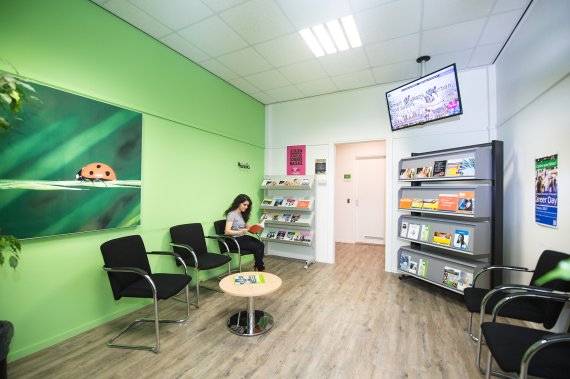<Foto: Sven Menschel>
Suzanne van Dinther does not think a survey of 122 students can give an accurate picture of the situation. ‘I think this needs to be much more extensive. There are 10,000 students at Wageningen University, and only 122 were questioned. I don’t think that’s a very good indicator.’ The doctor says she is open to making changes if there is dissatisfaction among a big group of students, but she does not get the impression that is the case.’
An often-heard complaint was that the practice’s website was not up-to-date in English, so international students could not find the information they needed. According to Van Dinther, the website has now been updated in English and there is an informative video online explaining how the healthcare system works in the Netherlands. There was no complaints form available on the English website either. ‘That form is there now, but hasn’t been filled in by anyone yet. Anyway, I hear very few complaints at the practice. We really do our best and much goes well. I think it’s a great pity that what came up in the survey was mainly individual complaints and that we had to hear them like that. It would be better for students to come to us, and then we’ll try to solve it.’
Another complaint was that students felt they were not taken seriously. Yanina Willet of S&I: ‘There are stories of students who were wrongly diagnosed. As a result they did not feel at ease with the doctors. When we reported this, the doctors’ response was that this was an exception, but we still feel it shouldn’t happen at all.’ According to Van Dinther, this is not correct, and she and her colleagues do their utmost to take everyone seriously. In her view most of the complaints reflect cultural differences. ‘Here you usually go to a GP before you are referred to a specialist. If your knee is swollen we can’t always say straightaway what kind of injury it is. So we send you home to rest. That doesn’t mean we’ve diagnosed you wrongly.’
If I am unwell there I get sent straight to a specialist who does all sorts of tests.
Peijun Peng
Peijun Peng of S&I was used to a different approach in China. ‘If I am unwell there I get sent straight to a specialist who does all sorts of tests. A little while ago I fell off my bicycle and I had to come back to the GP twice. Only then was I referred to a specialist.’ Actually Peng forgot to make the appointment with the specialist and the symptoms cleared up by themselves. According to Willet this example illustrates the importance of clear communication with international students. ‘If it is normal in your own country to go straight to a specialist, and it is different here, you want good information about that.’
Another common grumble among the students surveyed concerned long waiting times. ‘Of course it’s annoying to wait between half an hour and an hour at the doctor’s if you are not well,’ says Willet. But Van Dinther says delays are sometimes unavoidable. ‘If students suddenly come in with three symptoms while you’ve got ten minutes per appointment, you are running late in no time. You either send the student away without discussing all their ailments or you run late.’ Exactly when the large-scale survey will take place is not clear. According to Van Dinther it will be in the summer.

